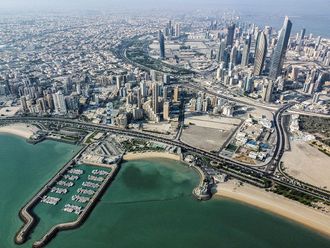
CAIRO: Polling stations opened on Sunday for Egyptians to vote in a presidential election overshadowed by war in neighbouring Gaza and with little doubt that the incumbent Abdul Fattah Al SiSsi will secure a third term.
Before polls opened at 09am (0700 GMT), dozens of voters had already crowded in front of a polling station in a central Cairo school amidst heavy security, an AFP correspondent reported.
Voting will take place from until Tuesday, between 9am and 9pm (0700-1900 GMT) each day, with the official results announced on December 18.
In front of the Cairo polling station, posters bore messages to “get out and participate” while a DJ played nationalist songs.
Some 67 million people are eligible to vote, and all eyes will be on turnout after successive previous elections mustered low participation figures.
Egyptians, meanwhile, have paid little attention to electoral campaigns that have taken place in the shadow of the war between Israel and Hamas in Gaza.
Gaza conflict
That conflict has monopolised media and public attention across the Arab world. Talk shows in Egypt have sought to link the two issues in the incumbent’s favour.
“We cannot sit idly by and watch, we will go out and say ‘no to the transfer’ (of Gazans),” said one TV presenter, Ahmed Moussa, echoing a speech by Al Sissi at the start of the war in October.
The three other candidates are all relative unknowns among the public: Farid Zahran, leader of the left-leaning Egyptian Social Democratic Party; Abdul Sanad Yamama, from the Wafd, a century-old but relatively marginal party; and Hazem Omar, from the Republican People’s Party.
Of the trio, Omar appeared to come out on top during a televised debate between the candidates. Al Sissi did not attend and sent an MP in his place.
Al Sissi, a retired field marshall in the Egyptian army, came to power in 2013 after leading the overthrow of elected Islamist president Mohamed Morsi following mass protests.
In both the 2014 and 2018 elections, he won landslide victories with over 96 per cent of the vote, according to official results.
He later extended the presidential mandate from four to six years and amended the constitution to raise the limit on consecutive terms in office from two to three.
Given that context, turnout is likely to be a key indicator of public sentiment. At the last election it fell six points to 41.5 per cent.
Al Sisi is credited with engineering a return to calm in the country after the chaos that followed the 2011 uprising that overthrew Hosni Mubarak.
Since the start of his first term, the president has promised to restore stability, including for the economy.
From 2016 onwards, he has undertaken a host of economic reforms that saw the currency devalued and the number of civil servants slashed.














